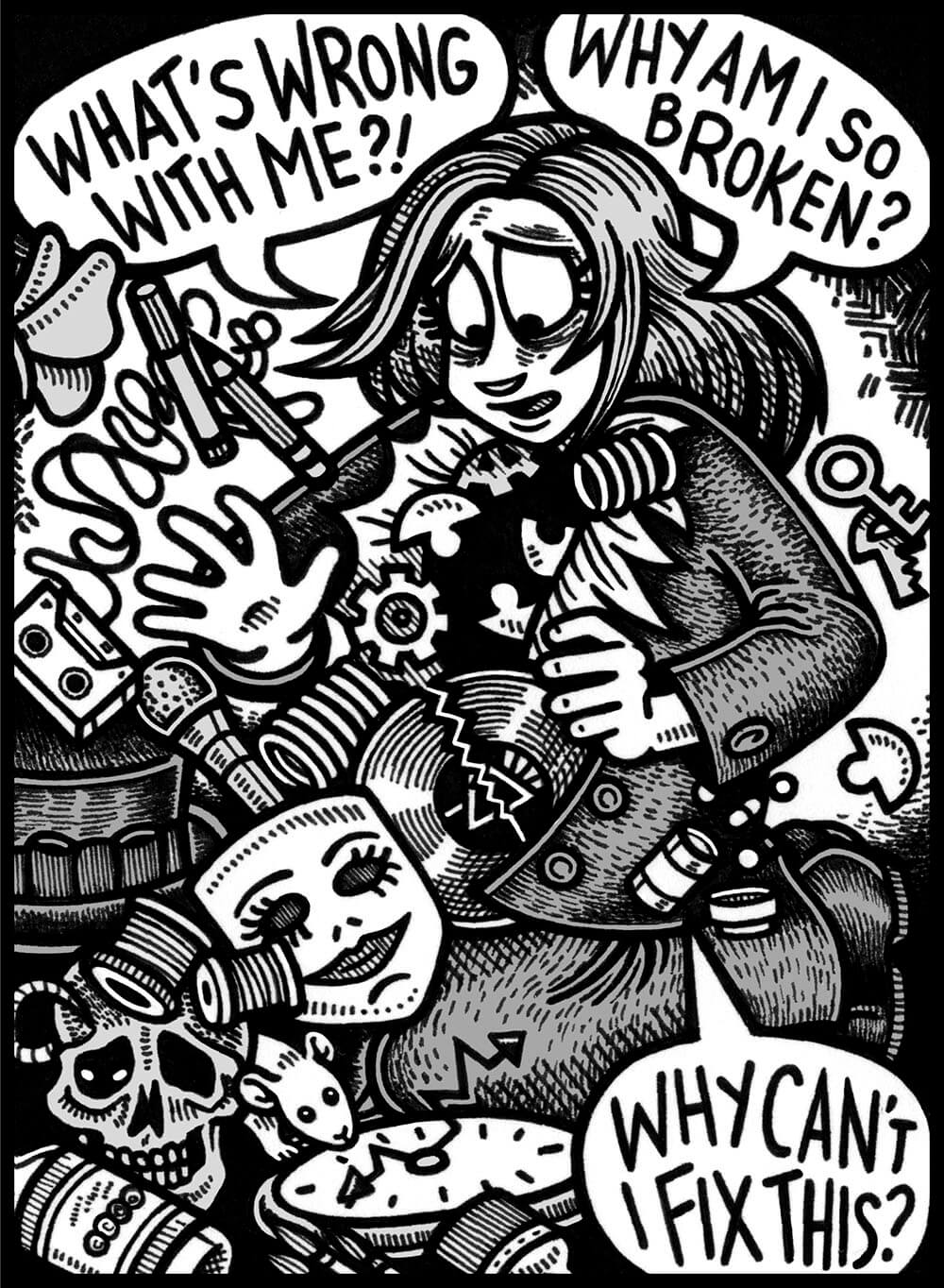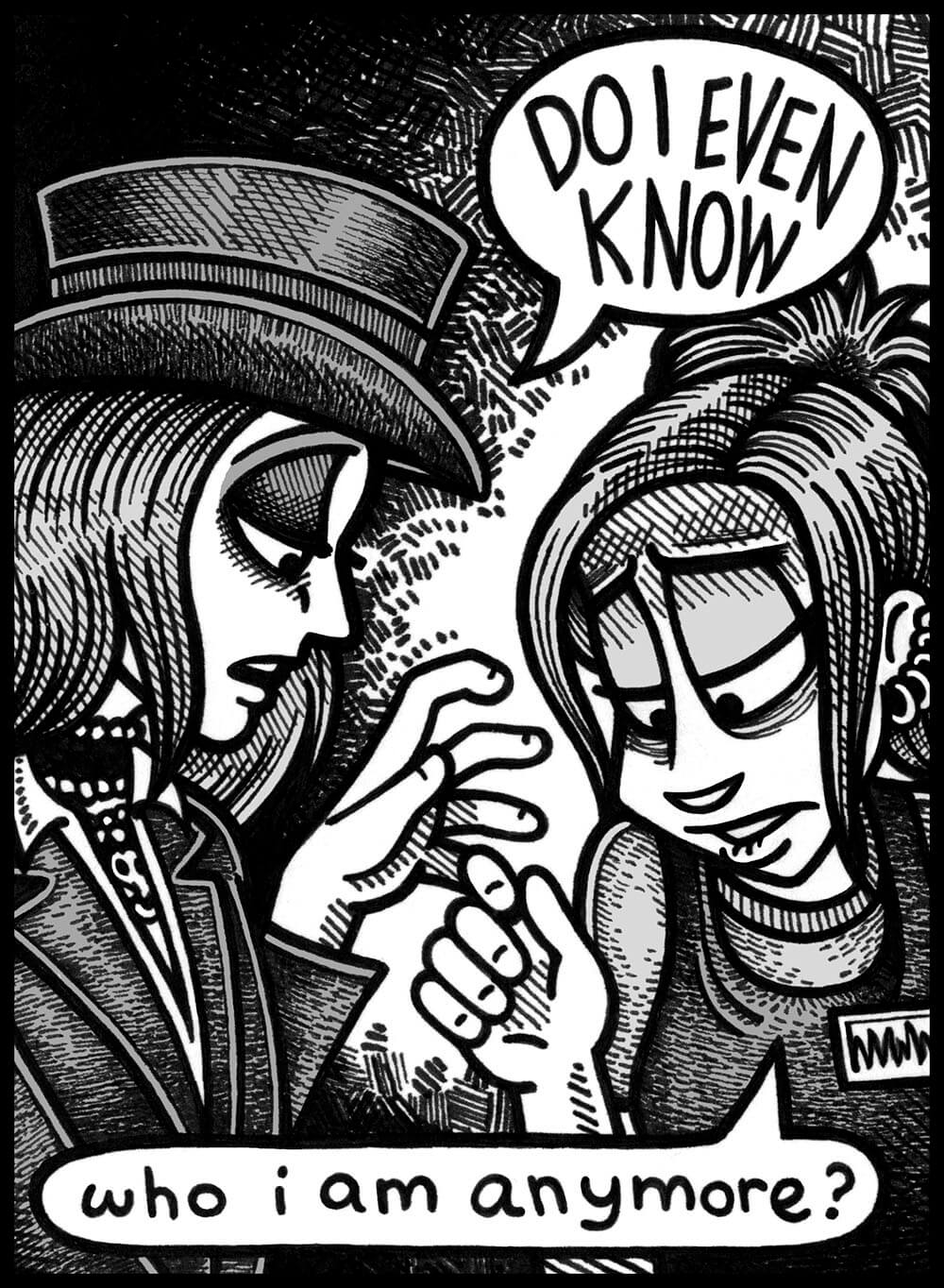On Autism and Autonomy
In late 2020, after more than forty years of confusion, ostracization, struggle, and a lifelong search for answers, I figured out I am on the autism spectrum. I am also diagnosed with ADHD, OCD, Major Depressive Disorder, Panic Disorder, and PTSD. Post-Traumatic Stress Disorder is too often part of the experience of being autistic. The modern world is a harsh place for the neurodivergent.
I do my best to be a good person and do what is right. Despite this, I have been called cruel things such as: asshole, crazy, psychotic, sociopathic, narcissistic, dishonest, lazy, selfish, rude, snappy, and even, yes — retarded.
Fortunately, for me, I can reflect upon these labels with amusement.
The cultivation of self-knowledge and a strong sense of identity removes the power of such labels. When you know who you are, you will not allow others to define you. Malignant and weak-minded people run from uncomfortable truths. They will attempt to destroy what they cannot either own or control.
Truth is the key that frees us from the prison of our past.
The truth is this: You are allowed to be different. You are not required to meet expectations that other people impose upon you. Someone is not automatically in the right because they are an authority figure, or present themselves as one. You are allowed to say, “No,” even when you feel something is expected of you.
If someone attempts to tell you who you are: run. Run, and never look back.
Your life is yours alone to live how you choose.
How did I get here?
Of particular interest to me is how my misdiagnosed and undiagnosed disabilities have impacted my schooling and employment history. It is possible that diagnosis and intervention in childhood could have steered me toward a more sustainable career path. Instead, my life has been punctuated by burnout and instability.
As a teenager, part of me unconsciously knew I was ill-suited for the college-to-desk-work career track. I come from a family of blue-collar labourers. My parents did me a disservice by not allowing me to take my high school’s auto shop class. I prefer working with my hands, and I enjoy machinery and problem-solving.
The intermingling of sexism (i.e. “that’s not for girls”) must also be mentioned. Having never felt “like a girl” in the first place, it requires forgiveness and careful mindfulness to avoid becoming bitter about the decisions made for me.
I believe I would have had a productive and satisfying life as a machinist, mechanic, or similar profession. When my “day job,” is tolerable, I have never minded concurrant traditional employment and self-employment. However, feeling it the “correct” thing to do, my parents forced me to enroll in my local community college. I was unable to attend my classes regularly, retain the material I was shown, and I dropped out after barely six weeks. I never returned.
My tumultuous employment history is made up of almost exclusively poorly-paying service jobs. I am a particularly bad fit for these jobs, which require me to camouflage my autistic traits and behave in ways that are extremely unnatural to me. The inevitable conclusion of prolonged masking for me is autistic burnout, chronic fatigue, recurrent severe depression, and suicidal ideation.
It is by creativity, luck, and resilience that I have survived.
What is autism?
Autism is a neurodevelopmental disorder that affects how an individual on the spectrum relates to other people and interacts with the world. Though there are common traits, each autistic person’s specific abilities and disabilities are unique. Autism is believed to be caused by a combination of environmental and genetic factors. There are controversial treatments available, but no cure.
Speaking for myself, I have significant difficulties with verbal and nonverbal communication, the ability to “read” people, over-stimulation and other sensory issues, repetitive behaviours, and executive function. This translates to problems being at my shifts on time, understanding what is expected of me, maintaining my focus, and interacting with customers, coworkers, and supervisors.
I typically last 1-2 years at full-time employment in these conditions before my mental health deteriorates and I enter a period of intense autistic burnout. I am part of an unfortunate group of people who are disabled, but not disabled enough for public assistance. With a little help, compassion, and minor accommodations, it is easily possible for someone like me to thrive. I want to work, after all.
I want to be able to do things for myself. Most adults want that.
Though diagnoses are increasing, it is my opinion that autism is historically under-diagnosed. It is my opinion that, like ADHD, autism is an uncommon but normal variation in human brain structure. The epidemic is the loss of non-service jobs, and alternative life paths, for people with atypical needs. The modern world was designed for a neurotypical brain, without time for other brains to adapt.
Instead of attempting to cure autism, especially in individuals with no cognitive impairments, we should be focusing on the positive characteristics and strengths of autism. Instead of autistic awareness, promote autistic acceptance.
Communicating directly and honestly benefits everyone.

What is having autism like?
For me, it is living in a state of confusion, distraction, and over-stimulation. Nearly everything that a neurotypical person takes for granted as easy or simple requires conscious thought for me. Even the most basic activities of daily living have an additional layer of complexity and energy-sapping frustration.
My sensory issues are primarily auditory. My brain lacks the ability to filter through sounds in the way that a neurotypical brain does. In any environment, my brains “hears” all audio at once, and at equal priority. The buzzing of a light bulb is perceived to be just as important as, for example, what is being said to me by a supervisor. A friendly dinner date in a noisy room becomes work.
Imagine yourself standing in a batting cage, and being pelted with balls by several pitching machines. The balls assaulting you, in my case, are sound. That is my daily experience when I am outside my apartment shopping, socializing, and working. Some days I can handle it. Some days it is overwhelming.
Often I can hear electricity in items such as phone chargers.
Conversations, music, television, and any other form of verbal language are particularly distressing to me. Being exposed to multiple layers of these sounds at once is almost unbearable. If I cannot leave such an environment quickly, I will lose the ability to regulate myself, and eventually shut down entirely.
I spend a lot of time in what you may consider silence, but it is not. The sounds of clocks ticking, birds calling, distant conversations, cars, sirens, and the other signs of life are ever-present. I am fond of fans and white noise generators.
Imagine holding down a job while coping daily with fight-or-flight.
What about the social impairments?
I have auditory processing issues that make it more challenging for me to comprehend speech. In the rare instances that I watch movies or television, I prefer to have captions or subtitles turned on. Seeing and reading the words helps me follow the narrative. I do poorly with only verbal instructions.
I have mild echolalia and palilalia. Frequently, I repeat myself when speaking, which can be annoying for the listener. I restate things said to me, to ensure that I have understood the speaker correctly. This is usually misinterpreted as me not paying attention, or mocking the speaker. My tone of voice, when I cannot actively modulate it, tends to sound disinterested and flat, or child-like.
I have a powerful need for the world around me to make sense. If a person tells me to “stop being lazy” or “stop lying,” and I know I am not being lazy or lying, I am unlikely to alter my behaviour. Why would I, when it makes no sense?
Like many autistic people, I can be obliviously blunt, and too honest.
I tend to miss sarcasm and nuance in spoken language, and to take statements literally. Communication with me needs to be clear, direct, and explicit. Conflicting and contradictory information causes me incredible distress. Struggling to resolve my observed reality, and what I have been made or told to believe, has been the root of nearly all my dysfunctional behaviour in the past. Gaslighting.
I was conditioned from childhood, including through the use of intimidation and violence, to ignore my own anxieties, intuition, and needs, and to always do what I was “supposed” to do instead. That one bit of programming has brought me immeasurable misery and pain. I was programmed to accept abuse.
Now I know better.
What am I bad at?
“If you know the enemy and know yourself, you need not fear the result of a hundred battles. – Sun Tzu, “The Art of War”
Though I am writing about autism, I believe this applies universally.
It may seem counterintuitive, but in my opinion, honestly assessing your weaknesses is more vital to success than honestly assessing your strengths. Taking inventory of your strengths is an exercise in gratification of the ego. On the other hand, regularly reevaluating your own flaws and weaknesses is not a practice most people are comfortable with. This is one area where my autistic ability to be more analytical, detached, and logical has benefitted me.
I prioritize achieving the goals I desire, arriving at the correct answers and conclusions, and understanding how things work. This means easily admitting when I am wrong, adapting my views to accommodate new information, and attempting to view situations in the most objective manner possible.
Lying to yourself may be comforting, but it is ultimately self-destructive.
My autistic diagnosis made it easier for me to understand my disabilities and where my weaknesses lie. This, in turn, made it easier for me to understand how and why I most often fail. Understanding failure is the key to not repeating it.
It is also important to distinguish between your “fixed” and your “soluble” weaknesses. I can, for example, lift weights to gain physical strength. That is a soluble weakness. I cannot, however, magically grow six inches taller to reach a high shelf. That is a fixed weakness that requires accommodation or a separate tool. (I know these are not actually weaknesses like I intend. I hope you will accept these examples for the purpose of a clear, simple explanation.)
Resolve your soluble weaknesses, and work around your fixed weaknesses.
How does this play out in the real world?
For most of 2019, I was employed as an aide in assisted living facilities for seniors. I spent the majority of that time in memory care housing, working with advanced dementia patients. More recently in late 2021, I was employed as a personal care assistant to a physically disabled person in their home.
I genuinely enjoy being helpful, and I am unbothered by job duties such as cleaning up bodily fluids and bowel movement. However, these are some of the worst possible jobs I could have. Here are some concrete reasons why:
– Clients are often confused, confusing, and argumentative.
– Clients are more susceptible to misinterpreting autistic communication.
– Difficult for autistic caregiver to correctly interpret clients’ communication.
– Difficult for autistic caregiver to “read minds” to determine clients’ needs.
– Instructions and order of activities are often illogical.
– Unpredictable and often unexplained task-switching is required.
– Breaks and meal times are loosely enforced or neglected entirely.
– Nature of the job makes it impossible to establish any kind of routine.
– Environments with music, noise, televisions, and talking are over-stimulating.
– Poor boundaries and mutual loneliness can make the job emotionally taxing.
– Autistic people can be naive and easily taken advantage of by employers.
– Autistic people are more likely to be targets of bullying and abuse.
After a year of caregiving in 2019, I burned out so deeply and thoroughly that I am still not fully recovered. When my most recent employment situation became unhealthy and untenable for me, I made the effort to understand why. I now know that service jobs strike at nearly all of my fixed weaknesses.
I can, to an extent, mask my autism. It is exhausting and unsustainable.

What am I good at?
In November, I began the search for a new job. Based on my newly-acquired understanding of myself, I looked for jobs that would be most compatible with my strengths. I prioritized physical activity and repetitive tasks. I looked for jobs that could offer me the consistency, predictability, routine, and stability that I need. And I avoided jobs which centered on communication and social interaction.
My peak creativity and performance are achieved at the intersection of high physical fatigue and low mental fatigue. Burning off excess energy is essential to my sedentary creative work, and also restful, regenerative sleep. The more I am able to engage in the behaviours that feel natural to me, the lower my mental fatigue. Physical fatigue affects me little. Mental fatigue is debilitating.
“Natural” behaviours to me include sorting things and putting them into order, creating and organizing systems, pattern recognition, and problem-solving. I also need to feel comfortable enough to not continuously monitor and control my body language, tone of voice, words, etc. I need to feel safe enough to be myself.
Entry-level manufacturing or a warehouse position became my goal.
My new job is in a warehouse. My position, at its core, is extremely repetitive. Additionally, I have been given a large amount of autonomy to better organize and improve the efficiency of how my job is done. My supervisors have already noticed and complimented me on my improvements. I regularly log over 10k steps, lift and move objects, and do dozens of squats every shift.
My coworkers are mostly immigrants, who generally keep to themselves. Everyone is busy. Conversations are almost exclusively work-related. Expectations and goals are reasonable and well-defined.
I work the same hours, with the same breaks, on the same days.
Every week. Like clockwork.
So having autism means having the right job?
Maybe? Certainly, every job has its honeymoon phase, before the petty annoyances and grievances begin to set in. But I am confident that I have found the correct environment for me. The steady clacking and whirring of machinery is calming to me. The repetitive tasks that many would find mind-numbingly boring are similar to my self-soothing, stimming behaviours. No one cares or even notices how weird I am. No one cares if I hide away on my breaks.
My new employer asks about and makes accommodations for me. Small allowances can make an incredible difference in my mental health and quality of life. My new employer uses the correct pronouns when speaking to me. I do not have to defend or explain the traits of my autism, as if I choose to be autistic. Coworkers and supervisors are patient when I need things (re)explained.
I am no longer being accused of being a bad person, or being called undesirable things, because people can sense that I am different. It is validating to be treated like a whole person. It is good to feel safe enough to be authentic; to be myself. I feel appreciated, heard, and like my ideas and contributions have value. Because of that I feel accepted, and included, as well. I feel respected. I feel human.
At the end of each shift, I leave my job dirty and tired. I am also happy. And afterward, I return home able to enjoy the rest of my evening with my partner. As I adjust to the increase in physical activity, I am resuming my creative work. I am surrounded by supportive coworkers, family, and friends. My days and nights are filled with joy and love. I am poor. My life is not easy, but it is good.
In conclusion…
You cannot put a price on the value of knowing yourself.
I do not speak for all autistic people. I can write only about my own experiences. By doing so, perhaps others will consider new perspectives or gain insight.
The employment statistics for autistic adults are depressing. Many people with autism are truly unable to work. Or, like me, they may need a little help, but they are not disabled enough for public assistance. Additionally, there are an unknown number of undiagnosed autistic adults unemployed, underemployed, or barely hanging on. It is a depressing, discouraging, and invalidating place to be.
I am blessed to have carved a small niche for myself in the world.
My story is not inspirational. No one should have to live the life that I have.
For every “Jin Wicked” there are hundreds, if not thousands, of autistic adults who fall through the cracks. Everyone relishes a tale of triumph against the odds, but what about the rest? We are all deserving of dignity, regardless of our abilities and disabilities. We are all deserving of a life free from abuse and shame. And we are all deserving of the support needed to be live as independently as possible.
I am educating myself about resources such as the Autistic Self Advocacy Network and the ADA. A public list is available of books that I find helpful. I am learning about my legal protections and rights as an autistic person. No longer will I tolerate blaming, shaming, and bullying behaviours toward me.
I am different, but autism does not make me any less human.
I will continue to speak out for both myself and others.
To me, that is the correct and right thing to do.
Note: This post originally appeared on my previous blog at JinWicked.com. It has been republished here for archival and informational/reference purposes.

















